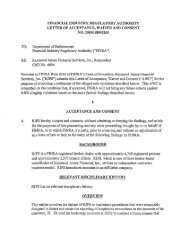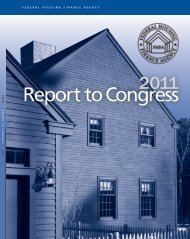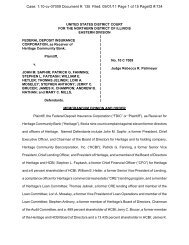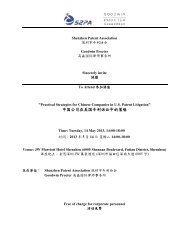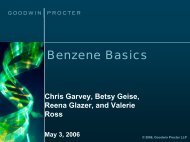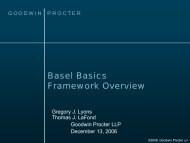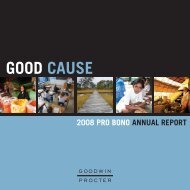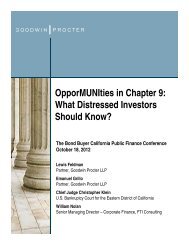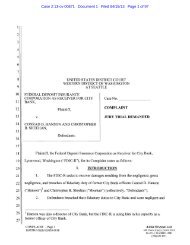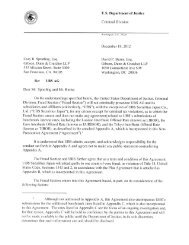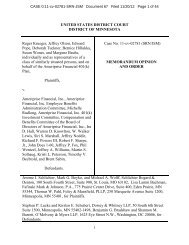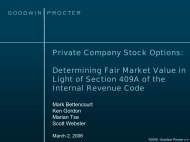SPhinX Chapter 15 Opinion Misses the Mark - Goodwin Procter LLP
SPhinX Chapter 15 Opinion Misses the Mark - Goodwin Procter LLP
SPhinX Chapter 15 Opinion Misses the Mark - Goodwin Procter LLP
Create successful ePaper yourself
Turn your PDF publications into a flip-book with our unique Google optimized e-Paper software.
<strong>the</strong> task fairly (although it is not clear<br />
from <strong>the</strong> opinion that <strong>the</strong>re is anything of<br />
substance in <strong>the</strong> Cayman Islands to be<br />
wound up); <strong>the</strong> winding-up proceedings<br />
will primarily affect investors who have<br />
not opposed <strong>the</strong> petition for recognition<br />
as a foreign main proceeding; <strong>the</strong>re are<br />
no o<strong>the</strong>r pending insolvency proceedings<br />
involving <strong>the</strong> debtors; Cayman Islands<br />
regulations require a winding up <strong>the</strong>re.<br />
Balancing all of <strong>the</strong>se factors, <strong>the</strong> court<br />
might be inclined to find <strong>the</strong> debtors’<br />
COMI in <strong>the</strong> Cayman Islands and<br />
recognize <strong>the</strong> proceedings as foreign main<br />
proceedings (noting, however, <strong>the</strong> limited<br />
practical effect of such recognition and<br />
<strong>the</strong> court’s ongoing duty to protect parties<br />
in interest).<br />
Notwithstanding that a simple<br />
“‘location of administration of <strong>the</strong><br />
debtor’s interests test’ could well result<br />
in a different outcome...because <strong>the</strong>se are<br />
liquidation cases in which competent<br />
JOLs under <strong>the</strong> supervision of <strong>the</strong><br />
Cayman court are <strong>the</strong> only parties ready<br />
to perform <strong>the</strong> winding up function, and,<br />
importantly, <strong>the</strong> vast majority of <strong>the</strong><br />
parties in interest tacitly support that<br />
approach, normally <strong>the</strong> court would<br />
recognize <strong>the</strong> Cayman Islands proceedings<br />
as main proceedings.” 28 The<br />
court <strong>the</strong>n reverses direction and declines<br />
to designate <strong>the</strong> <strong>SPhinX</strong> Funds foreign<br />
proceedings as foreign main proceedings<br />
because <strong>the</strong>y were filed for <strong>the</strong> improper<br />
purpose of obtaining <strong>the</strong> §362 automatic<br />
stay to block <strong>the</strong> appeal of <strong>the</strong> settlement:<br />
“Indeed, given that <strong>the</strong> JOLs did not<br />
articulate a proper basis, or even actively<br />
pursue a request, for any o<strong>the</strong>r relief<br />
under chapter <strong>15</strong>—for example, an<br />
injunction or turnover of property—with<br />
<strong>the</strong> exception of a request for fur<strong>the</strong>r<br />
discovery primarily relating to <strong>the</strong> appeals<br />
(transcript citation omitted), this litigation<br />
strategy appears to be <strong>the</strong> only reason for<br />
<strong>the</strong>ir request for recognition of <strong>the</strong><br />
Cayman Islands proceedings as foreign<br />
main proceedings.” 29 This analysis<br />
summons <strong>the</strong> ghost of §304 and is wholly<br />
irrelevant to a recognition decision, which<br />
is just a validation of <strong>the</strong> existence of <strong>the</strong><br />
foreign proceeding, its compliance with<br />
<strong>the</strong> definitional requirements of §<strong>15</strong>02<br />
and confirmation that <strong>the</strong> foreign<br />
representative also meets <strong>the</strong> definitional<br />
criteria.<br />
Conclusion<br />
In <strong>the</strong> end, <strong>the</strong> court’s deviations<br />
from <strong>the</strong> statute and congressional intent<br />
28 Id. at 27.<br />
29 Id. at 28.<br />
caused no harm to <strong>the</strong> <strong>SPhinX</strong> Funds<br />
parties. No stay of <strong>the</strong> appeal was<br />
entered and no o<strong>the</strong>r relief was granted.<br />
If recognition had been denied, as it<br />
should have been, <strong>the</strong> result would have<br />
been <strong>the</strong> same. However, <strong>the</strong>re may be<br />
great harm to <strong>the</strong> future of chapter <strong>15</strong><br />
if o<strong>the</strong>r courts follow <strong>the</strong> <strong>SPhinX</strong> Funds<br />
opinion. Recognition is not severable<br />
from <strong>the</strong> determination of <strong>the</strong> nature and<br />
eligibility of <strong>the</strong> foreign proceeding; <strong>the</strong><br />
petition for recognition and <strong>the</strong><br />
determination of <strong>the</strong> nature of <strong>the</strong><br />
foreign proceeding—main or nonmain—should<br />
be based on objective<br />
considerations. No flexible, subjective<br />
considerations should apply to <strong>the</strong><br />
decision to enter or decline an order of<br />
recognition. If an order of recognition<br />
enters because <strong>the</strong> foreign proceeding<br />
meets <strong>the</strong> objective requirements of<br />
§<strong>15</strong>17, requests for relief by <strong>the</strong> foreign<br />
representative and requests by creditors<br />
and o<strong>the</strong>r interested parties for<br />
protection or modification of relief<br />
require consideration of motives,<br />
interests, benefits and o<strong>the</strong>r subjective<br />
factors. At that point, <strong>the</strong> court will have<br />
<strong>the</strong> ability to act with <strong>the</strong> full range of<br />
flexibility that it has identified as<br />
informing chapter <strong>15</strong>.<br />
Finally, <strong>the</strong> judgment creates a wholly<br />
unnecessary, serious and regrettable<br />
breach with European case law on <strong>the</strong><br />
meaning of key concepts taken from a<br />
European statute. It threatens to break <strong>the</strong><br />
very unanimity that is meant to be at <strong>the</strong><br />
heart of <strong>the</strong> Model Law and <strong>the</strong> goal of<br />
uniform interpretation throughout <strong>the</strong><br />
world reflected in §<strong>15</strong>08. ■<br />
Reprinted with permission from <strong>the</strong> ABI<br />
Journal, Vol. XXV, No. 10, December/<br />
January 2007.<br />
The American Bankruptcy Institute is a<br />
multi-disciplinary, nonpartisan organization<br />
devoted to bankruptcy issues. ABI<br />
has more than 11,500 members,<br />
representing all facets of <strong>the</strong> insolvency<br />
field. For more information, visit ABI World<br />
at www.abiworld.org.<br />
44 Canal Center Plaza, Suite 404 • Alexandria, VA 22314 • (703) 739-0800 • Fax (703) 739-1060 • www.abiworld.org



